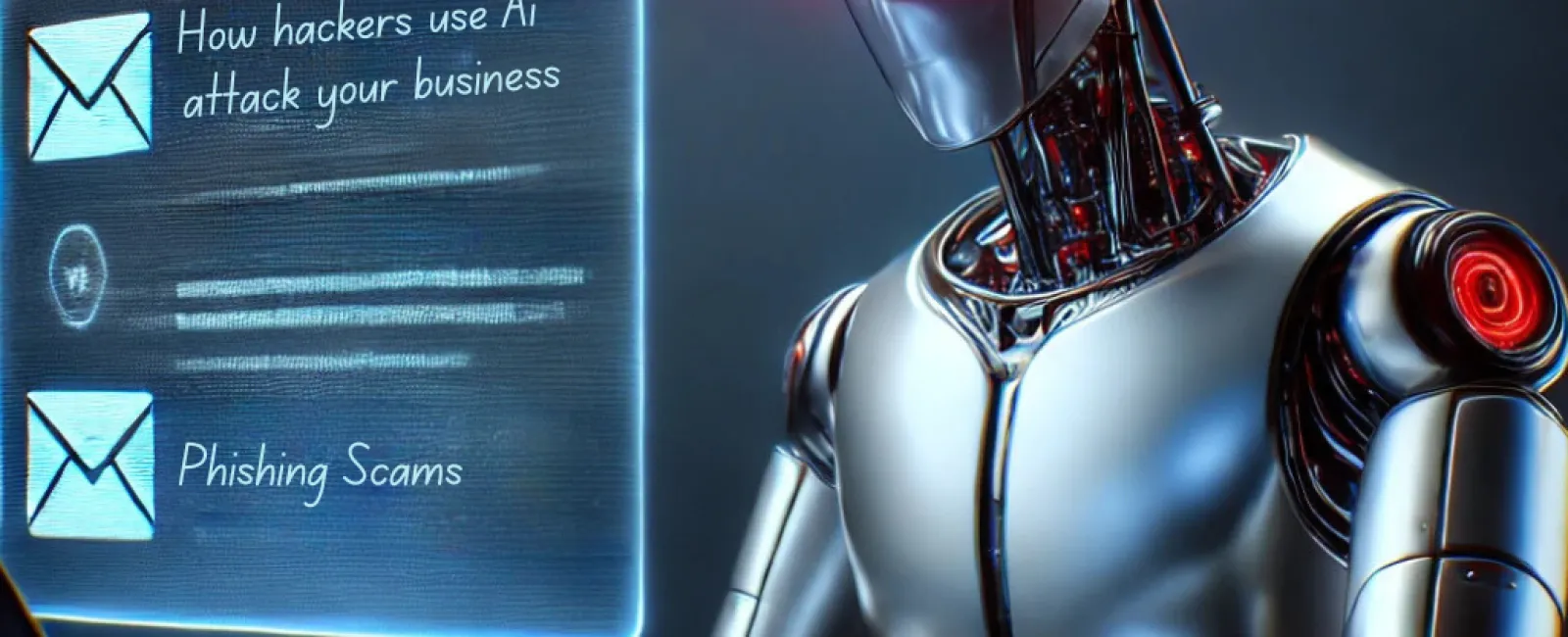January 20, 2025
If you believe that hackers are solely focusing on Fortune 500 companies, it's time to reconsider.
Artificial intelligence has empowered cybercriminals to expand their attacks on an unprecedented scale, with small businesses becoming prime targets. Why is this the case? Cybercriminals recognize that while small businesses may lack the extensive resources of large corporations, they still possess valuable data ripe for exploitation.
Gone are the days when hackers relied on poorly constructed emails or basic password-guessing software. With AI, they now have access to sophisticated, rapid tools that can outsmart and outmaneuver businesses that are unprepared. Without a robust defense in place, they will inevitably find a way in.
Here's how hackers are leveraging AI and, crucially, how you can safeguard yourself from becoming their next victim.
AI-Powered Phishing Scams
Traditional phishing attacks often involved generic emails riddled with spelling and grammar mistakes. You've probably seen a few of these. AI has raised the stakes by generating highly personalized, convincing messages tailored to specific targets. Hackers use AI to:
- Gather personal information from social media and business websites.
- Create emails that imitate real contacts or brands.
- Adjust language and tone to sound genuine.
Example: Picture receiving an email that appears to be from your bank. It's personally addressed, mentions your company name, and refers to a recent "transaction attempt" that was declined. It prompts you to "click here to confirm your information" or "update your credit card details to avoid account suspension."
The attack unfolds as follows:
- Clicking the link leads you to a fake website that looks identical to your bank's login page. Entering your credentials allows hackers to capture your username and password.
- Alternatively, the link could install malware on your system, quietly granting hackers access to your data, keystrokes, or even your entire network.
The outcome? Hackers acquire what they need to drain your account, steal sensitive business data, or initiate further attacks on your company.
Automated Vulnerability Scanning
Hackers now utilize AI to automate the scanning of small businesses for vulnerabilities. AI-powered tools can:
- Detect outdated software or weak network configurations.
- Target these vulnerabilities more swiftly than ever before.
Impact: Small businesses with limited IT resources often fall victim to these automated attacks. Hackers can identify and exploit a weakness within minutes, gaining access to your systems before you even realize there's an issue. The consequences? Costly downtime, data theft, or even complete loss of network access.
AI-Driven Malware
AI enables hackers to develop rapidly evolving malware. These malicious programs:
- Evade detection by learning how antivirus software operates.
- Adapt in real-time to exploit new vulnerabilities.
Real Threat: AI-powered ransomware can now lock down systems more quickly and demand ransoms more effectively, increasing the risk for small businesses.
Deepfake Technology for Social Engineering
AI-generated deepfake videos and audio have moved beyond Hollywood. Hackers use this technology to impersonate executives or trusted contacts, persuading employees to:
- Transfer funds.
- Share sensitive information.
Example: Imagine your CFO receives a call that sounds exactly like your CEO, complete with their tone, phrasing, and urgency. The "CEO" instructs the CFO to urgently wire funds to a vendor to close a big deal. The voice is so convincing that the CFO complies without hesitation, only to later discover that the funds were sent to a fraudulent account.
Deepfakes make these scams alarmingly believable, leaving even the most cautious employees susceptible to manipulation.
Advanced Password Cracking
AI-powered algorithms can guess passwords with incredible speed. Using techniques like pattern recognition, hackers can crack even moderately strong passwords.
Tip: Multifactor authentication is no longer optional; it's essential to combat this growing threat.
How to Protect Your Business From AI-Powered Cyberthreats
- Invest in AI-Driven Defenses: Utilize cybersecurity tools that harness AI to detect and respond to threats in real-time.
- Educate Your Team: Train employees to recognize phishing attempts and social engineering tactics.
- Conduct Regular Audits: Regularly assess your IT infrastructure for vulnerabilities.
- Strengthen Authentication: Implement multifactor authentication and encourage the use of strong, unique passwords.
- Partner with Experts: Managed IT providers can help small businesses stay ahead with proactive monitoring and security solutions.
AI is revolutionizing cybersecurity for both attackers and defenders. While hackers are using AI to exploit vulnerabilities, businesses can also leverage it to strengthen their defenses. Staying informed and proactive is crucial to keeping your business secure in this ever-evolving digital battlefield.
Ready to fortify your business? Click here or call our office at 419-678-2083 to
schedule a FREE 10-Minute Discovery Call
today to ensure your defenses are AI-proof.





